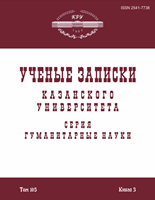О роли генерализации в процессе онтогенеза темпорального дейксиса
On the Role of Generalization in the Process of Temporal Deixis Ontogenesis
Author(s): G.R. Dobrova, O.I. PetelinaSubject(s): Psycholinguistics, Cognitive linguistics, Preschool education, Educational Psychology, Cognitive Psychology, Developmental Psychology
Published by: Казанский (Приволжский) федеральный университет
Keywords: deixis; temporal deixis; temporal units; speech ontogenesis; generalization; reference point; adverbs of time;
Summary/Abstract: This article examines the role of generalization in the process of mastering temporal deixis in preschool children. Up to a certain age, children have difficulty in the acquisition of deixis, which is due to their individual and age-related characteristics, subjective perception of time, and inability to adjust to an actual starting point when it fails to match their “I-here-now” understanding. Here, the results of an analysis of children’s statements (from our notes and the diary entries by various authors) and the experimental data from 54 children aged 4 to 7 years are discussed and summarized. A number of examples are provided that prove the key importance of generalization skills in the acquisition of temporal deixis by preschool children. Detailed investigation of children’s statements reveals that most preschool children make incorrect generalizations in the early stages of speech ontogenesis: they often use “labels” (certain general “temporal” words that do not depend on the reference point) to mark time intervals, confuse and interchange antonyms like “tomorrow” and “yesterday”, use the same temporal word to refer to all past or future events, or mix up various associative series that belong to the category of time. However, through the incorrect choice and use of deictic means, young children gradually begin to recognize the meaning and correct use of deictic units. Thus, generalization facilitates children’s ability to comprehend language and its phenomena, such as the use of temporal deixis. The obtained results may be helpful for further psycholinguistic and ontolinguistic research, for teaching special courses on psycholinguistics, and for the work of specialists in the field of preschool education and speech ontogenesis.
Journal: Ученые записки Казанского университета. Серия Гуманитарные науки
- Issue Year: 165/2023
- Issue No: 3
- Page Range: 79-90
- Page Count: 12
- Language: Russian

